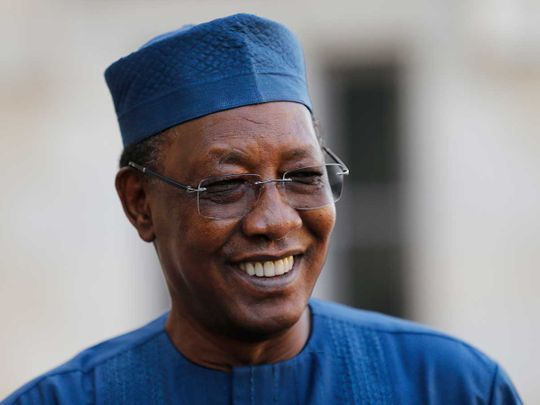
N'Djamena: Chad's President Idriss Deby Itno has died on the battlefield after three decades in power, the army announced on state television on Tuesday.
The shock announcement came only the day after the 68-year-old was proclaimed the winner of a presidential election that had given him a sixth term in office.
The army said Deby had been commanding his army at the weekend as it battled against rebels who had launched a major incursion into the north of the country on election day.
Deby "has just breathed his last breath defending the sovereign nation on the battlefield," army spokesman General Azem Bermandoa Agouna said in a statement read out on state television.
Deby, 68, had ruled Chad with an iron fist for three decades but was a key ally in the West's anti-jihadist campaign in the troubled Sahel region.
The army said a military council led by the late president's 37-year-old son Mahamat Idriss Deby Itno, a four-star general, would replace him.
On Monday, the army had claimed a "great victory" in its battle against the rebels from neighbouring Libya, saying it had killed 300 fighters, with the loss of five soldiers in its own ranks during eight days of combat.
Deby would have been one of the longest-serving leaders in the world, after provisional results showed him winning the April 11 election.
He was a herder's son from the Zaghawa ethnic group who took the classic path to power through the army, and relished the military culture.
His latest election victory - with almost 80 per cent of the vote - had never been in doubt, with a divided opposition, boycott calls, and a campaign in which demonstrations were banned or dispersed.
Deby had campaigned on a promise of bringing peace and security to the region, but his pledges were undermined by the rebel incursion.
The government had sought Monday to assure concerned residents that the offensive was over.
There had been panic in some areas of N'Djamena on Monday after tanks were deployed along the city's main roads, an AFP journalist reported.
The tanks were later withdrawn apart from a perimeter around the president's office, which is under heavy security during normal times.
"The establishment of a security deployment in certain areas of the capital seems to have been misunderstood," government spokesman Cherif Mahamat Zene had said on Twitter on Monday.
"There is no particular threat to fear."
However, the US embassy in N'Djamena had on Saturday ordered non-essential personnel to leave the country, warning of possible violence in the capital. Britain also urged its nationals to leave.
France's embassy said in an advisory to its nationals in Chad that the deployment was a precaution and there was no specific threat to the capital.
The rebel raid in the provinces of Tibesti and Kanem was carried out by the Front for Change and Concord in Chad (FACT), based in Libya.








